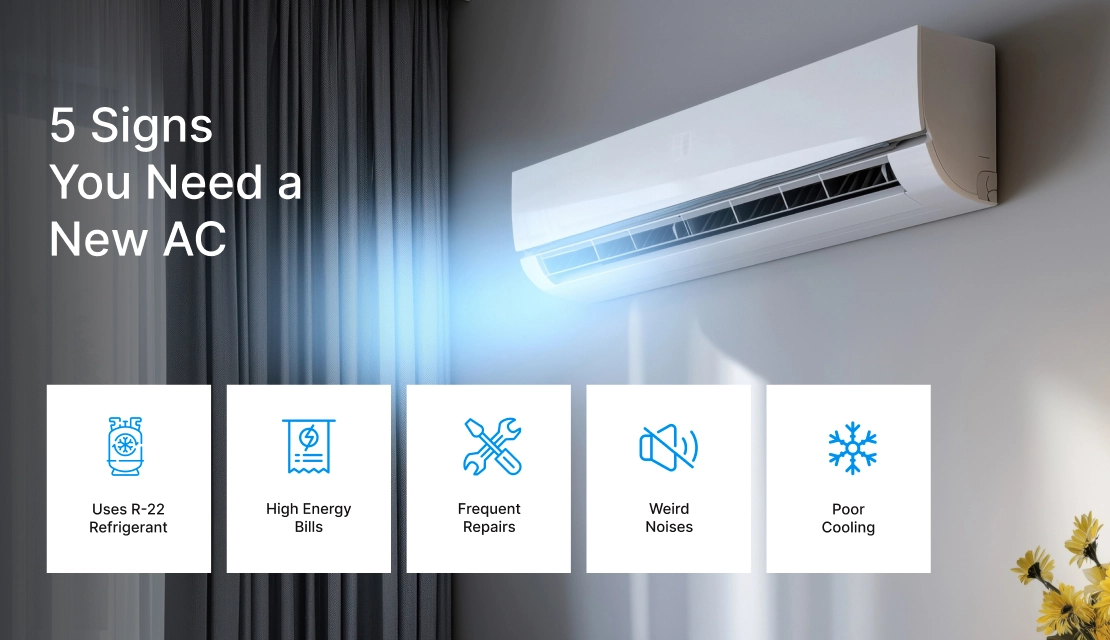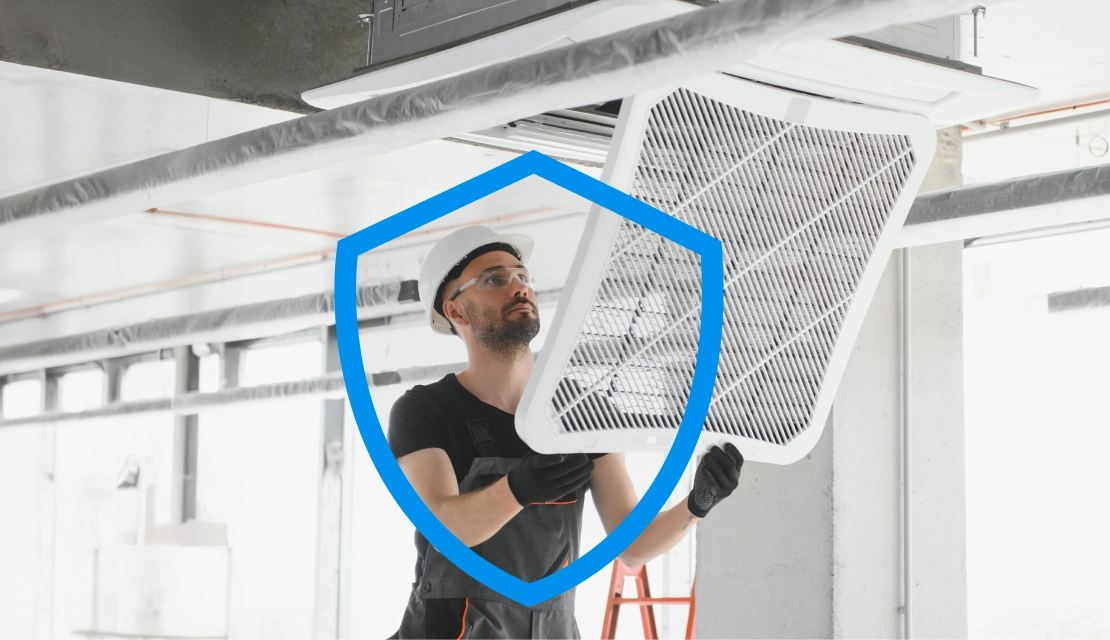

Swapping out your old air conditioner isn’t exactly something that crosses your mind until the day it becomes a necessity. But here you are, thinking about the replacement of air conditioner. And you are probably wondering what it is going to cost and how even to start.
Spoiler: The cost goes beyond just buying the unit.
You’ll need to factor in size, efficiency, brands, and who is going to install it right. All of these can trip you up if you are not careful.
Sounds complicated? It doesn’t have to be.
A little planning and the right information make this decision a whole lot easier.
This guide is packed with the answers you need so that you can stay cool without stressing over every little detail. Let’s jump in!.
Air conditioners aren’t built to last forever. Sadly, even the best systems have a shelf life of around 15 to 20 years.
Sometimes, taking good care of it with regular maintenance and quick repairs can make it run strong toward the upper end of that range.
But if repairs are starting to add up, it might be time to start thinking ahead.
Factors that can impact how long your AC sticks around include:
Knowing what affects your AC’s life can help you decide whether to go for repair or replacement when problems pop up.
From strange noises to rising energy bills, there are a few telltale signs that your AC might be on its last legs. Pay attention to these red flags to decide if it’s time to consider replacing the unit.

Is your air conditioner over 10 years old and still using R-22 refrigerant? Since R-22 was phased out in 2020, and it’s no longer produced, refilling it is getting harder and more expensive.
Consider replacing your old unit with a more modern, eco-friendly system that uses high-GWP refrigerants like R-410A for better performance and cost-efficiency.
Did you notice your electricity bill soaring without a clear cause?
An older, inefficient AC system might be to blame. As units age, they consume more energy to cool your home, leading to higher costs.
Even with regular maintenance, it can’t match the energy savings of more efficient models. So, it might be a sign to consider replacing your AC to reduce energy usage and save on bills.
If you are spending more and more on repairs each year, it could be time for an air conditioner replacement. Minor repairs are to be expected with older units. However, if you are facing frequent breakdowns each season, it may indicate that your system is nearing the end of its lifespan.
In such cases, upgrading to the latest and energy-saving model is a cost-effective solution.
Is your AC making odd sounds like screeching or clanking? That is a red flag that something inside isn’t functioning properly. While a technician can likely fix it, recurring problems could mean it may be time to consider replacing the unit.
If your AC’s cooling ability has dropped, even though the air coming out is still cold, the issue could be a failing motor. Even with regular filter changes and maintenance, older units often lose their cooling power.
It might be time to evaluate whether a repair can fix it or if you should consider upgrading to a new one for better efficiency.
When it is time to replace your cooling unit, knowing who to call can make the process less overwhelming. Fortunately, homeowners have a few solid options depending on their needs and situation.
If you have ever searched online for “air conditioner replacement near me,” you might have come across independent contractors offering services directly to homeowners.
These professionals often work on their own or with a small team to provide personalized service. They are mostly ideal for handling emergency replacements.
HVAC companies specialize in all things related to air conditioning systems. They have experienced teams of technicians and installers who can efficiently handle AC replacements.
These businesses often offer warranties on their work and may even assist with the purchase of a new unit, ensuring you are getting the best system for your home.
If your AC is covered under a home warranty, you can file a claim when it breaks down. Your home warranty provider will send an experienced technician to assess the issue. If a repair isn’t possible, the company will handle the replacement, so you don’t have to worry about anything.

Figuring out AC or HVAC replacement costs can be a bit tricky! Several factors come into play that can impact your total cost. Let us take a closer look at what could influence your budget before you make the big decision.
The kind of AC you choose plays a big role in the replacement cost. Central air systems are a go-to pick, typically costing between $2,500 and $4,500.
Split systems are a bit more affordable, running around $2,000 to $3,000. While geothermal or air-source heat pumps cost can stretch anywhere from $4,500 to $12,000.
If you have a bigger home, you’ll likely need a more powerful (and pricier) AC. An HVAC expert will do a load calculation to figure out the right unit based on your home’s size, ceiling height, and even the number of windows.
Getting it wrong can cost you. A unit that is too small will run all the time, while one that is too big won’t cool properly and could spike your bills.
High-efficiency ACs cost more at first but can help shrink your monthly energy bills. Seasonal Energy Efficiency Ratio (SEER) and Energy Efficiency Ratio (EER) ratings show how well your system cools, and a higher number is better.
If your unit also heats your home, don’t forget to check HSPF (Heating Seasonal Performance Factor) and AFUE (Annual Fuel Utilization Efficiency). They measure heating efficiency and fuel use, so you get the full picture.
When your ductwork and wiring are already in place, installation is pretty straightforward and also easier on the wallet. But if the setup needs new ducts, added wiring, or adjustments, costs can rise.
Long refrigerant lines or tricky wiring routes can also bump up the price. Plus, labor rates vary by area, so it’s smart to shop around for quotes.
Replacement of air conditioner doesn’t have to be a stressful ride. Though at first it might seem like a big task, it is really a chance to invest in more comfortable days ahead.
Think of it as a smart move for today and a thoughtful gift for the future. Take a little time to understand your options, talk to the right people, and trust yourself to make a choice that fits your home and your lifestyle. Because real comfort is personal and your home deserves to feel just right, season after season.
Replacing your AC is often a smart decision if your current system is aging, inefficient, or needs constant repairs. A new, energy-efficient unit can lower your energy bills, reduce repair costs, and ensure consistent performance in the long run.
HVAC professionals suggest getting your air conditioning unit inspected at least annually, preferably during the spring, just before the summer heat kicks in. If your AC is older (over 10 years) or frequently used, it’s a good idea to have it serviced twice a year—once in the spring and again in the fall.
In certain situations, you can consider replacing just the outdoor (condenser) unit, especially if the indoor unit is still relatively new and the outdoor unit is still under warranty.
Air conditioners typically last 10-20 years with proper care. Factors like extreme weather, poor installation, overuse, and neglect of maintenance can cut short their life expectancy.
Disclaimer: The information in this article is intended to provide guidance on the proper maintenance and care of systems and appliances in the home. Not all the topics mentioned are covered by our home warranty plans. Please review your home warranty contract carefully to understand your coverage.
Our blogs and articles may link to third-party sites that offer products, services, coaches, consultants, and/or experts. Any such link is provided for reference only and not intended as an endorsement or statement that the information provided by the other party is accurate. We are not compensated for any products or services purchased from these third-party links.

Don’t wait until it’s too late! Check out our current plans and get your free quote.

Household Tips
Do you remember that fresh, mirror-like shine your stainless steel appliances had on day one? The shine is amazing, but keeping it that way can feel like a daily battle,..

Home Warranty
Home warranty exclusions and coverage limits can vary when comparing home warranty companies. That said, most omissions are pretty standard. Here are the most common exclusions to remember when buying..

Home Warranty
With so many choices, home warranty comparisons seem tough – but they don’t have to be. You just need to narrow your options. Finding the right company and plan to..